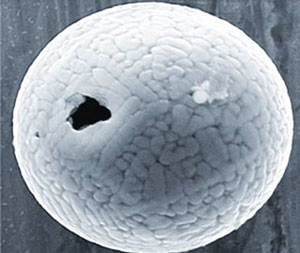Find the 'oldest' space dust on earth
Japanese geological experts said they found pieces of meteorite, or dust, falling to Earth 240 million years ago.
 Space dust found in Japan - Photo : Wired.
Space dust found in Japan - Photo : Wired.
According to Physorg , the research team led by Dr. Tetsuji Onoue ( Kagoshima University ) is studying a form of microcrystalline quartz at Ajiro Island.
Each year there are about 30,000 tons of space dust, mostly from comets and small planets, falling to the earth. However, it is difficult to find because they are microscopic and due to the way they spread after falling to the earth. In order to survive intact for 240 million years, Mr. Onoue's prototype must first 'survive' after being burned in the atmosphere (90% of the dust of the earth falls to earth).
After that, they will fall into some kind of sediment, covered and kept safe for thousands of centuries. At an estimated age of 240 million years, extremely small iron-rich globules of 'old' Onoue are about 50 million years older than any space dust found previously on earth.
In the report published in the journal Geology published earlier this month, Onoue described how to search for meteorites hidden in horn stone. First they have to crush the stone, then use a sieve to sift the ice powder. Next, the ready-to-clean powder is washed and filtered again with a magnet. Later, the experts examined the results with an electron microscope and found globular masses that were only about 10 microns in diameter (1 micron = 1 millionth of a meter).
- What does dust storm on Earth look like from space?
- Dust-producing asteroids can combat climate change on Earth
- Meteors created the oldest rocks of the Earth
- Find extremely rare space dust in Antarctic snow
- Find the oldest Earth's crater
- NASA creates cosmic dust in the laboratory
- Cosmic dust can knock off living things in the atmosphere
- The terrible 'made in China' dust around the Earth
- New record of walking in space
- 14 oldest ancient artifacts in the world
- Can the Mars probe ship be hit with dust?
- We come out of the dust, and then come back to make dust - what is dust after all?
 Van Allen's belt and evidence that the Apollo 11 mission to the Moon was myth
Van Allen's belt and evidence that the Apollo 11 mission to the Moon was myth The levels of civilization in the universe (Kardashev scale)
The levels of civilization in the universe (Kardashev scale) Today Mars, the sun and the Earth are aligned
Today Mars, the sun and the Earth are aligned The Amazon owner announced a secret plan to build a space base for thousands of people
The Amazon owner announced a secret plan to build a space base for thousands of people